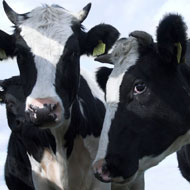Cattle pre-movement test changes in Wales

Cattle will be required to have a pre-movement test before they can be transported to or from their main holding.
The Welsh government is reminding farmers in Wales that from tomorrow, Wednesday, October 1, cattle will be required to have a pre-movement test before they can be transported to or from their main holding as part of bovine TB control measures.
Deputy minister for farming and food, Rebecca Evans, reminded farmers that cattle moving within sole occupancy authorities (SOAs) will not have an automatic pre-movement testing (PrM) exemption. However, an interim land association management (ILAM) arrangement has been established to help manage cattle movements between parcels of land that fall within an existing SOA.
An ILAM agreement allows herd keepers to move their animals without a PrM Test providing certain criteria are met and that the movements are within 10 miles of the main holding.
Rebecca Evans said; "Our comprehensive eradication programme, which has now been in place for more than five years, is based on solid evidence and includes annual testing of cattle, strict bio-security measures and movement control.
"The latest figures, that show the situation to the end of June this year, reveal the measures we have put in place have worked together to produce a 27 per cent decline in the number of cattle slaughtered in Wales as a result of bovine TB compared to the previous year.
"In addition, for the February to June 2014 period, the figures reveal that new incidents of the disease were at their lowest level since 2008.
"Since last November we have not been accepting new SOA applications. By ending automatic pre movement test exemptions within SOAs we are further reducing the risk of TB spreading across Wales by limiting the movement of untested cattle between two pieces of land that could be many miles apart.
"That kind of movement represents an unacceptable disease risk, which these new changes now deals with."



 The veterinary mental health charity Vetlife is inviting the veterinary community to join it for a sponsored cold-water dip.
The veterinary mental health charity Vetlife is inviting the veterinary community to join it for a sponsored cold-water dip.